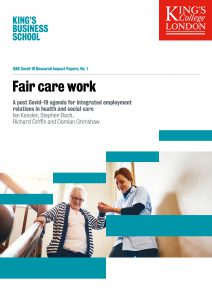 Richard Griffin MBE is Visiting Senior Research Fellow, King’s Business School. (434 words)
Richard Griffin MBE is Visiting Senior Research Fellow, King’s Business School. (434 words)
I write a fair bit about the challenges and barriers support workers can face. Research by King’s College London and others has identified persistent issues such as poor job design, lack of funding for training, pay levels that too often do not reflect the extended nature of the roles and poor progression pathways. I thought though, particularly in the run up to the Royal College of Midwives’ annual Maternity Support Worker Week (23-27 November) and the Royal College of Nursing’s first Nursing Support Worker Day (23 November), I would set out my views of some of the ways these problems can be addressed in the NHS. Continue reading
